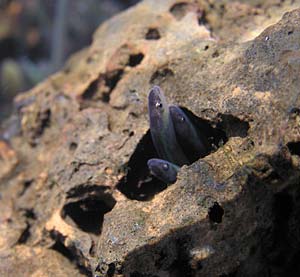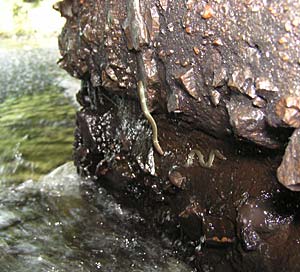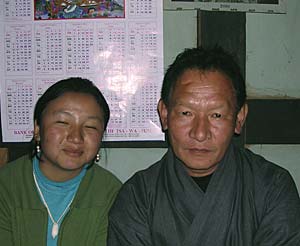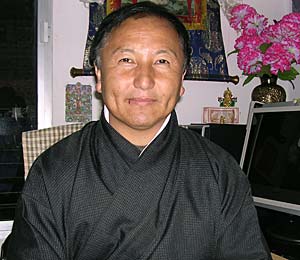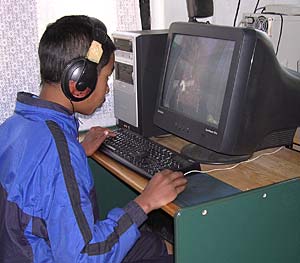May 20, 2005
Air Date: May 20, 2005
FULL SHOW
SEGMENTS
Beyond Kyoto
View the page for this story
The Kyoto Protocol on climate change only went into effect in February, but environmental experts from 190 nations are already looking ahead to what happens after the treaty's first commitment period expires in 2012. Host Steve Curwood talks with Jennifer Morgan, director of the International Climate Change Program for the World Wildlife Fund, about a recent conference on the post-Kyoto world in Bonn, Germany. (05:30)
Polluted Defense Sites
/ Jeff YoungView the page for this story
Many of the military bases slated for closure are highly contaminated. Cleaning them up could be the biggest barrier to putting the bases to new civilian use. Living on Earth’s Jeff Young looks at what lessons can be learned from past rounds of base closures. (06:30)
Save the Eel
/ Nancy CohenView the page for this story
Tim and Doug Watts have been fascinated with eels since they were kids growing up in Easton, Massachusetts. Now, as adults, the brothers are on a mission: to get the government to protect the American Eel as an endangered species. Nancy Cohen of member station WNPR spent the day with the Watts to find out why they’re concerned about this slimy creature. (07:30)
A New Old Age
View the page for this story
Growing old doesn't have to be about nursing homes and wheelchairs, as Dr. Bill Thomas writes in his new book, "What are Old People For? How Elders Will Save the World." Dr. Thomas talks with host Steve Curwood about how our elders could be powerful leaders, if only society would let them lead. (08:30)
Emerging Science Note/What the Nose Knows
/ Katie ZemtseffView the page for this story
Living on Earth's Katie Zemtseff reports on the power of suggestion and our sense of smell. (01:20)
The Buddha is One…and Zeros
/ Karen MichelView the page for this story
As part of the country’s goal to achieve “gross national happiness,” the king of Bhutan has allowed television and internet access in the Buddhist kingdom. Not all residents have electricity or are computer literate, but six years after the media ban was lifted Bhutan is seeing the effects of opening their world to outside influences. Karen Michel reports. (15:30)
This week's EarthEar selection
listen /
download
Show Credits and Funders
Show Transcript
HOST: Steve Curwood
GUESTS: Jennifer Morgan, Bill Thomas
REPORTERS: Jeff Young, Nancy Cohen, Karen Michel
NOTE: Katie Zemtseff
Beyond Kyoto
CURWOOD: From the Jennifer and Ted Stanley Studios in Somerville, Massachusetts, this is Living on Earth. I’m Steve Curwood.
The Kyoto Protocol to produce greenhouse gas emissions took effect just three months ago, but already climate experts from a hundred ninety countries are looking ahead to what comes after the treaty’s first commitment period ends in 2012. They met recently in Bonn, Germany and, among other issues, looked at ways to include developing nations such as China and India, as well as the world’s largest emitter of greenhouse gases, the United States in any future reduction regime.
The gathering comes amid recent scientific reports documenting that the earth has already begun to absorb more heat than it radiates and that global warming could spin out of control if steps are not taken to cut greenhouse gas emissions. Jennifer Morgan, who directs the International Climate Change Program for the World Wildlife Fund, attended the conference and joins us now from Bonn. Hello, Jennifer.
MORGAN: Hello.
CURWOOD: Now, Jennifer, this is the first time that Kyoto participants have assembled since, well, I guess you call it a particularly contentious meeting last December in Buenos Aires. What was the tone like at this gathering and what if any concrete action came out of it?
MORGAN: Well, the tone was very constructive and very forward-looking by the vast majority of the delegates here in Bonn. And the concrete action that came out, I guess, is that there is momentum for beginning negotiations um, at the next formal meeting of the protocol and that’s very new. I think that especially from developing countries there was quite an urgency expressed here.
CURWOOD: What are some of the scenarios being discussed that would encourage the commitment of developing countries to some kind of limits on their greenhouse gas emissions in the next phase of the Kyoto agreement?
MORGAN: Well, I think there’s two key elements here. I think one is that developing countries are already doing quite a lot. China, for example, is doing much more than the United States on renewable energy and I think they could be encouraged to do more through the carbon markets that have opened up with the entry into force the Kyoto Protocol. We now have a new currency and if developing countries could get finance it through the market to for example, build much more renewable energy than building new coal plants. They’re interested in that. Brazil said that, Argentina, and Mexico and China said that, so I think that’s one side of it.
The other side, which was very striking, is that these countries presented as I’ve never heard them before the impacts that are happening already in their countries and the fact that climate change is threatening their own development and, therefore, they know that something more needs to happen.
CURWOOD: What are these developing countries calling for over the near term?
MORGAN: Well, over the near term they’re calling for things, um, a mixture of things. The first is, of course, that in order for them to take additional steps and reduce their, their emissions, they need the financial and technical support to do so. These are not countries with high GDPs by any stretch of the imagination. They may be growing, but they’re still developing countries.
The other concrete thing or medium, short-term step was that South Africa and a number of other countries called for a Montreal mandate and what that, basically, means is that in Montréal at the next international climate meeting, countries would formally start negotiating for what comes after 2012 which is the end of the current Kyoto Protocol and would launch formal negotiations. Now, we still have a ways to go to get there, but the fact that they’re opening up that door and opening that door means their commitment will be on the table was a very different conversation then we had in December.
CURWOOD: What would it take to get the U.S. to sign on to mandatory greenhouse gas reductions?
MORGAN: Well, I think that there’s a lot happening in the U.S. right now to help with that outside of the White House and I think so you need to have domestic support for it and you do have that in many parts of the country, in the Northeast of the United States, California, the cities that just signed up from New York to Seattle to the Kyoto target. I think that’s one piece of the puzzle and the companies that are acting on it, but you really need a White House to wake up and understand that climate change is a serious problem that is, the majority of which is caused by humans and everyone from Prime Minister Blair to you know, the head of GE is now saying this. I’m not quite sure what the president needs to hear.
CURWOOD: What’s the next step then for the Kyoto process?
MORGAN: The next step is, there’ll be a series of technical meetings the next couple of weeks, but in the hallways I think people will be talking about what could this launch of negotiations or Montréal mandate look like and then they’ll come back together again in November in Montréal to discuss that and, hopefully, to come together to say, ‘we can’t wait any longer. We need to begin talking and formally negotiating deeper cuts in greenhouse gas emissions to avoid the worst impacts. The time is short and the window for avoiding those impacts is closing quickly.’
CURWOOD: . Jennifer Morgan directs the International Climate Change Program for the World Wildlife Fund in Bonn, Germany. Thanks for taking this time with me today.
MORGAN: Thank you.
[MUSIC: “The Revolution” Sanctity: itnotmtdthw (Liquid Light) 2004]
Polluted Defense Sites
CURWOOD: When the Defense Department released its latest list of military
bases slated to be closed, state and local officials around the nation started scrambling.
Many are fighting to save their backyard bases and the jobs they provide. But if the military installations do go away localities will be looking to put the former defense department land to new civilian use as housing, parks, or industrial centers.
A number of the bases are on prime real estate; but many are also highly polluted with toxic dumps, tainted water and even unexploded bombs. Living on Earth’s Jeff Young reports that contamination is often the biggest challenge for those who would breathe new life into old military bases.
YOUNG: After more than 70 years of military activity on Cape Cod in Massachusetts,
Otis Air National Guard Base could be heading for retirement. It’s on the
latest list of installations the Defense Department wants to close and it’s
probably the one with the worst contamination. Cape Cod resident Peter Schlesinger says the base has a long, proud history that has also left a long list of pollutants.
SCHLESINGER: Fuels, aviation fuels, diesel spills, different types of cleaning solvents, rocket fuel additives, explosives.
YOUNG: Much of that was dumped right on top of the region’s main water source, and
has seeped into the aquifer. Which is why Schlesinger has joined federal and
state regulators and the military in a multi million-dollar effort to track
down and clean up contamination.
SCHLESINGER: Without clean water we don’t have jobs, we won’t have tourists,
we won’t be able to sell our homes, and we won’t have a safe place to bring up children.
YOUNG: The nonprofit Center for Public Environmental Oversight reviewed defense
records on 35 of the bases slated for closure and found widespread contamination. Center director Lenny Siegal found seven of the installations on the Environmental Protection Agency’s Superfund list of the worst toxic dumps. The Defense Department projects total cleanup costs at about 2-point-9 billion dollars. A lot of that cleanup is already underway. But Siegal says the cost is likely to go up after bases close down.
SIEGAL: Until you’re really out looking for problems because you’re going to do something with the property you may miss some of them so it’s quite possible that the final bill for cleanup at these sites will be somewhere around twice as much as what it is now.
YOUNG: From the last round of base closures in the 90s, about a quarter of the
land—some 138 thousand acres—has still not been transferred to local control. A report last month from the Government Accountability Office says that’s mostly due to the need for more environmental cleanup. The military is responsible for that job but the military’s definition of "clean" does not always match what regulators want. Tim Ford, with the nonprofit Association of Defense Communities, says that can leave the local government in a sort of bureaucratic crossfire.
FORD: You have the military services saying that they’ll only pay to have the land cleaned up to this standard then the states say ‘well, you have to clean it up to this other standard.’ And the people in the middle are the local redevelopment authority who can’t make anything happen because no one can agree on what the standard is going to be for cleanup.
YOUNG: Ford, Siegel and others say there are lessons to be learned from the earlier
base closures. Lesson one: communities need more information. At Colorado’s former Lowry Air Force base near Denver new homes and businesses are already in place. But resident Ann Callison says it has not gone smoothly. She’s been involved with the Air Force cleanup for more than a decade and says she asked for a full characterization of the site at one of their first meetings.
CALLISON: And it took nine years to get the first draft of that. In those nine years some development began and the results have not been pretty.
YOUNG: Homebuilders found soil laced with asbestos. Callison says that brought a
new round of cleanups, lawsuits and anxiety among homeowners—all of which
might have been avoided with earlier disclosure.
CALLISON: I would just suggest to all these leaders in these communities that
they get these operational site histories done pronto. This is the first step towards redevelopment.
YOUNG: Lesson two: follow the money. In Monterey County, California, the Army’s old Fort Ord took up thousands of scenic seaside acres--very valuable, but mostly still too dangerous to sell, largely due to unexploded ordnance. The military has already spent 300 million cleaning up Fort Ord and Redevelopment Authority Director Michael Houlemard says it could take twice that to finish the job. But Houlemard says government spending to clean closed bases has been going down.
HOULEMARD: It’s been reduced every year for the last six or seven. At the rate they’re funding it this year it will take 25 years to finish the cleanup.
YOUNG: The Defense Department says its funding is adequate. Alex Beehler is DOD’s assistant deputy undersecretary for environment safety and health. Beehler defends the military’s cleanup record and says they’re looking for ways to improve.
BEEHLER: We’re using the best, latest technology to make sure we can clean up successfully and completely in most effective and efficient manner. And we’re on the hook. We have to get the job done. If we don’t get the job done, we’re subject to all the strictures of law.
YOUNG: DOD has tried to persuade Congress to change some of the laws on toxic waste at bases. Environmental groups call those special exemptions that could make matters worse. Beehler says they’re simple clarifications. Congress has, so far, denied the military’s requests.
Back in Massachusetts, on Cape Cod, Peter Schlesinger keeps an eye on contamination at the Otis base, considers the hard lessons from other base closures and remains an optimist. He’s sure his community will benefit if Otis shuts down because he knows his neighbors will continue to demand a full cleanup.
SCHLESINGER: It’s the citizenry that get involved to read reports to think about
the material presented and be willing to stand up and this kind of citizen activism is
really required to effectively direct any base cleanup.
YOUNG: Consider it a call to arms for the civilians who want to make the most of
their old military bases. For Living on Earth, I’m Jeff Young in Washington.
Related links:
- - The Center for Public Environmental Oversight
- - Site for the Department of Defense’s Base Realignment and Closure (BRAC) Committee
- - Association of Defense Communities
- - The Military Toxics Project
[MUSIC]
CURWOOD: Coming up: It looks awful but it tastes great. And that combination may have the American Eel headed for the endangered species list. Keep listening to Living on Earth.
Save the Eel

Young eels attempting to climb through the dam spillgate at Weweantic River, MA. (Photo: Tim Watts ©2004/5)
CURWOOD: It’s Living on Earth. I’m Steve Curwood and coming up, how old people will save the world. But first: when it comes to protecting animals there are some that are an easy sell to the public--the ones with melodic songs, furry skin, bright colors or majestic size. But that leaves out most fish. The brothers Doug and Tim Watts want to protect a fish with a slimy reputation: the American Eel. They want it placed on the endangered species list. From member station WNPR in Hartford, Nancy Cohen explains why.
COHEN: Forty-year-old Doug Watts says when he and his big brother Tim were growing up in Easton, Massachusetts the woods and streams were their playground.
[AMBIENCE OUTSIDE TIM’S HOUSE]
D. WATTS: We could come home covered with mud. We could come home with snakes with turtles, with frogs, with bugs, you name it.
|
COHEN: And eels. They used eels as bait to catch striped bass on Cape Cod. And Tim recalls the time he and Doug saw an eel unlike any other they’d seen before. They were fishing in a pond with their father and they noticed some fishing tackle floating by. T.WATTS: We said ‘hey dad look at that bobber lets go grab it.’ So we pulled up our lines and went paddling over there and He hauled it up and there was this great big eel that, you know, was probably three feet long D. WATTS: It was black too! It was almost coal black. T. WATTS: It was probably as big around as your arm. COHEN: They cut the line and let the eel go, but the impression it made stayed with them. Today, Doug’s a writer with the Atlantic Salmon Journal in Maine and fights to protect migrating fish. Tim, a former Marine, is a janitor by night and keeps an eye on the eels by day. One place he checks on them is not far from his home: the Weweantic River in Wareham, Massachusetts. [SOUND OF WEWEANTIC DAM] 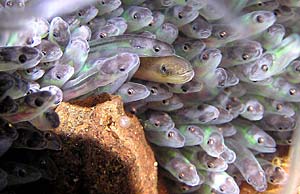 Glass eels & elvers stuck beneath the Horseshoe Pond Dam, Weweantic River Wareham, MA. (Photo: Tim Watts ©2004/5) |
T. WATTS: Couple days ago this place was loaded with ‘em up here all these little pockets in the rocks would be full of these little clumps of eels and I see very few up here now. I have a funny feeling somebody’s up here poaching them. COHEN: Tim says fishing for the American Eel is one reason its numbers are declining. Eels are considered a culinary delicacy. And demand from Asia and Europe has pushed up the price. Young eels are going for 275 dollars a pound this spring in Maine. And they face other threats including contaminants in rivers and loss of wetland habitat. Six months ago, the Watts brothers filed a petition with the U-S Fish and Wildlife Service asking that the American eel be listed as endangered. Experts are also concerned. A year ago, the Atlantic States Marine Fisheries Commission issued a statement saying the government should consider the American Eel a candidate for listing under the Endangered Species Act. A defining moment for the Watts brothers came nine years ago when they found a mass of migrating eels stuck below this old mill dam on the Weweantic River. The brothers spent several nights netting them and moving them over the dam. T. WATTS: If they have to sit below this dam three weeks two weeks a month you get a huge amounts of mortality through predators that you wouldn’t otherwise get if they had free passage upstream. COHEN: Every spring, Tim sees the same thing: one-year-old American Eels that can’t get past this dam. They’re only a little bigger than a toothpick and spend a lot of time hiding from predators like fish, crabs and birds. [SOUND OF WEWANTIC WATER] T. WATTS: And you turn over a rock [grunts] and from under the rock they all go squiggling away.
|

